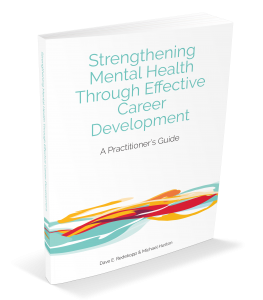Career development and mental health: How can I practise ethically?
Career practitioners can help generate positive mental health outcomes for clients without overstepping professional boundaries
Michael Huston and Dave Redekopp
 There is an important premise with respect to the ethical implications of practising career development with mental health awareness: Whether intended or not, career development intervention brings about positive mental health outcomes. The focus of this perspective is on career development intervention as a booster of mental health – a state of well-being – and not as an intervention for mental illness, which is associated with distress and impaired functioning (Public Health Agency of Canada, 2015). This idea isn’t completely new, but it is rapidly gaining interest from a wide range of stakeholders including career development practitioners. This article will share some of the discoveries that informed our recently released, CERIC-supported book, Strengthening Mental Health Through Effective Career Development: A Practitioner’s Guide. This book was developed based on extensive literature research and on feedback from front-line career development practitioners in Canada and Australia.
There is an important premise with respect to the ethical implications of practising career development with mental health awareness: Whether intended or not, career development intervention brings about positive mental health outcomes. The focus of this perspective is on career development intervention as a booster of mental health – a state of well-being – and not as an intervention for mental illness, which is associated with distress and impaired functioning (Public Health Agency of Canada, 2015). This idea isn’t completely new, but it is rapidly gaining interest from a wide range of stakeholders including career development practitioners. This article will share some of the discoveries that informed our recently released, CERIC-supported book, Strengthening Mental Health Through Effective Career Development: A Practitioner’s Guide. This book was developed based on extensive literature research and on feedback from front-line career development practitioners in Canada and Australia.
Implications of practising with mental health awareness

Our day-to-day activities change very little when practising with mental health awareness. The awareness implicates us and our profession in doing more to understand the issues and evidence and to communicate this information to our clients and stakeholders. We will continue to perform our career development work as we always have, except:
- We will be aware of the mental health impact of our work, and
- We will communicate the evidence about the positive mental health outcomes associated with career development.
The consultations leading to this book provided opportunities to hear practitioners’ reactions to the idea of career development intervention as a support for positive mental health. The most common fears we heard were related to competence and ethical practice, and the possibility of overstepping boundaries. Practitioners highlighted the following areas of concern:
- You identify as a career development practitioner responsible for creating career development outcomes. You have not thought about mental health outcomes as part of your work. This idea is new, and it forces you to reconsider your professional identity and integrate different thinking about your work and its impact.
- You are careful in all your work to not dabble in “personal counselling” and you therefore steer your clients away from talking about their personal concerns. Perhaps you have encountered an expert discussing how it is critical for career development practitioners to stay in the “career box” and leave personal content to other professionals.
- Your employer reminds you of the clear separation between your role and responsibilities as a career development practitioner and those of a mental health practitioner. These reminders are common in institutions that provide separate career development and mental health services.
- Your profession has not emphasized the mental health benefits of career development intervention. You have not had opportunities to learn how to integrate mental health outcomes in your practice. This area is new for most of us. Until recently, content addressing the positive mental health impact of our work hadn’t been included in education, professional development or practice guidelines for career development practitioners.
- You recognize you are not qualified to work with mental illness concerns. Even though you recognize and understand the difference between mental illness and positive mental health, when you hear the words “mental health,” you, like most of us, automatically think of mental illness. Your training and professional experience have led you to steer clear of addressing “mental health” in your work.
More on mental health on CERIC’s CareerWise website:
Overwhelm and burnout – what’s the difference?
What it means to consider trauma within career development
To put youth on path to well-being, we need to talk to them about careers
What are we to do?
With the above experiences in mind, concerns about overstepping make sense. What do we need to do to ethically practice with mental health awareness? Our understanding of career development as mental health intervention will expand considerably over the next few years. Here are some of the ways career development practitioners and our profession will be affected by integrating mental health awareness in career development practice:
Knowledge and skills – Practicing with mental health awareness implicates career development practitioners in establishing:
- an understanding of the evidence base supporting career development as a contributor to positive mental health,
- a basic understanding of mental health and mental illness (not as psychiatric experts), and
- skills for sharing this information with clients and other stakeholders.
Self-improvement – Practitioners and the field adapt to new information.
- Career development practitioners are committed to considering, learning and integrating new evidence.
- Our profession provides opportunities for professional development in the evidence about career development and mental health.
Boundaries of competence – Career development practitioners are clear that:
- their focus is on career development, and
- mental health and illness concerns are the professional domain of health-care professionals, but that doesn’t mean practitioners cannot discuss the mental health outcomes associated with career development.
Marketing – Evidence about career development and mental health outcomes is growing.
- Practitioners are implicated in knowing the meaning of evidence and communicating it accurately.
Integrity, honesty, objectivity – Career development practitioners are accountable for providing accurate information to clients and therefore must know:
- generally about mental health and have some understanding of mental health/illness concerns, and
- the evidence well enough to communicate it accurately and clearly so clients can make informed decisions.
Confidentiality and private information – Sharing mental health benefits will lead to more conversations about mental health and mental illness.
- Career development practitioners are clear and explicit about limits of confidentiality.
- Private information is shared only with client permission.
Informed consent – Mental health benefits are and will increasingly be an “expected” outcome of career development intervention.
- Career development practitioners are explicit and accurate about the nature of their services and their limitations.
Consultation – Working with mental health awareness will lead to more conversations about mental health and mental illness.
- To ensure client needs are addressed, career development practitioners may at times need to consult with colleagues and other professionals.
Respect for other professionals – Many other professionals interact with the clients of career development practitioners.
- Career development practitioners are clear about their own competence.
- Intervention with mental health concerns and mental illness is properly the domain of other professionals.
- Career development professionals refer as necessary.
- Career development professionals have relationships with other professionals and organizations as well as other potential referral resources.
In this article, you will have noticed a few recurrent key ideas. The fundamentals of our work haven’t changed by adding mental health awareness and, even if we change nothing, we will still be creating positive mental health outcomes for our clients. However, we can be intentional and improve these outcomes by learning more about mental health and its relationship to career development. The new guide is, we hope, a good start to understanding the evidence and how to use it to support your career development practice.
Michael Huston is a Counsellor and Associate Professor at Mount Royal University in Calgary. His research and work focus on counsellor training, career intervention strategies and outcomes, career development as mental health intervention, stress and coping, and work and well-being.
Dave Redekopp is President of Life-Role Development Group in Edmonton. Working for over 30 years in the wide-ranging career development field, he is still curious about worker-workplace relationships, work-life connections, psychological health, the quirkiness of human behaviour and more.
References
Public Health Agency of Canada. (2019). Mental illness. Retrieved from canada.ca/en/public-health/services/chronic-diseases/mental-illness.html

